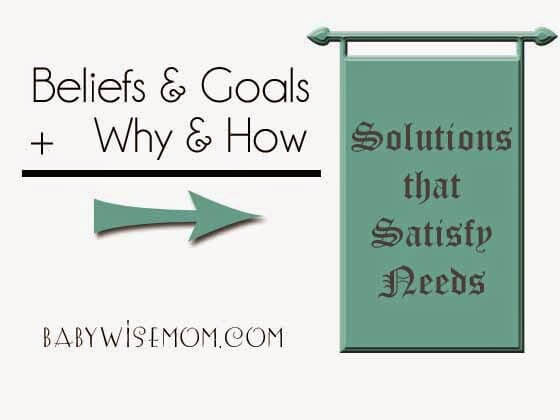Beliefs and Goals and How They Impact Parenting. How to be the parent you want to be.

The idea of beliefs and goals is talked about in On Becoming Toddlerwise (affiliate link) in the chapter entitled “The Land of Good Reason.” This chapter is also included in subsequent books in the -wise series. This chapter is quite applicable to moms with babies also.
When you are making decisions for your children of any ages, here is the equation (found on page 76 of Toddlerwise):
Belief + goal = Why + How = Solutions that Satisfy Needs
I have covered Why and How already (see Why vs. How )
Let’s talk about beliefs and goals. Understanding your beliefs and goals will better help you to understand your “Why” and keep things in perspective.
Beliefs
These are your beliefs about different areas of training for your children. You know these, but it might help you to write them out, or at least sit and purposefully think them out. Here are some sample categories of beliefs. You can of course add to them:
- Morality: What do you view to be morally right and morally wrong. Really think through situations. What is your view on stealing. What is your view on modesty. In our church, we stress morality to our youth. In teaching them, we tell them that they need to decide now what they will do in any given situation. It isn’t enough to think, “I will not do drugs if a friend offers.” You need to think, “If a friend offers me drugs, I am going to decline and then immediately leave the situation” or “If a friend offers me drugs, I am going to say ‘blah, blah, blah.” I was also taught this as a youth, and as I have gotten older, I have seen the wisdom in this council. Here is a simple example. When I was pregnant with Brayden, I had extremely bad morning sickness. I was throwing up all day and all night for all nine months. Well, six and a half. I didn’t get sick until I was eight weeks along. But I even threw up a couple of hours before he was born. Up to that point in my life, I hadn’t thrown up very often. I could count on one hand the number of times I had thrown up in life. I couldn’t even do that for one day of my pregnancy! I think you get the picture, and I know some of you are nodding your heads knowingly while others are shaking them in disbelief. One day early in my pregnancy, I suddenly needed to throw up. I was in the kitchen, and despite the fact that we lived in a tiny little apartment, I didn’t make it to the bathroom in time and threw up in my hand. I was immediately grossed out and flung my hand. I then had throw up all over the floor. I hadn’t ever thought to myself, “what will I do if I throw up in my hand?” Well, I did after that. I had every throw up scenario played out, and believe me that it helped me in restaurants, grocery stores, and the car. You have to think your morals through.
- Education: What are your education beliefs? What are your values? Is a high school diploma important to you? A college degree? How will you educate your child? What practices will you follow? What will you personally do? Where will you educate him? What do you want him to learn? Is an education only found in books? What topics need to be taught? What other things need to be taught?
- Faith and Religion: What role does religion play in your family? What do you believe about God? Is prayer and scripture study a regular part of your life? How will you pass these beliefs on to your children?
- Family/Parenting: What is your parenting style? Mother-led, father-led, child-led, co-regent leadership? What is the role of the parent? What is the role of the child?
- Friendships: What are your beliefs about friendships? What about community? Think these through.
- Finances: What do you believe about earning money? What do you believe about spending and saving? Do you pay tithing? Will you do allowance? What will you pay for versus your child paying for?
- Children: What do you believe about the nature of children? What do you believe they are capable of doing and understanding?
- Other.
As you think about it, you will be able to see how these beliefs will help you make your goals. Your beliefs will help you decide what you want to accomplish. For example, if you believe strong personal friendships are important, you will likely have a goal for something like a playgroup for your child. You would then structure your day to fit that goal in. Your goals exist because of your beliefs. Sometimes we have goals without really thinking about the belief behind it. Knowing these beliefs will help you understand the reason you are doing something (why).
As you make these goals, realize that you often need a number of small goals to reach your main goal. You can’t teach a child to be perfectly moral in one day, or with one goal. You need age appropriate goals that are manageable for both you and your child.
Also, bear in mind that there are a variety of goals that can be set to satisfy the belief. For example, let’s continue on with the friendship belief. You want your child to make friends, but you also have a young baby with a tight schedule. You have a belief that babies should get rest and not be disrupted often. Or maybe you have a belief that babies should eat every so often, and the time of the playgroup makes it so you couldn’t nurse your baby at regular times. This makes having a structured playgroup more of a challenge for you. So instead, you get a group of moms together to go to the park once or twice a week. Then you don’t have a lot of children in your home disrupting the baby and you have a situation where the disruption is less often. Your older child is then able to play with kids at the park. You can always find many solutions to meet your belief. This is in line with why vs. how, as linked above.
If your goals conflict with your beliefs, you will not meet them. You need to line up the two. Decide which is more important. Most often, it will be the belief. Occasionally, you will find that you need to change one belief to meet a higher belief. Knowing your beliefs will help you reduce frustration in your parenting. You will have a destination beyond getting through the day. You will set your child up for success because he will be reaching for something and you will be helping your child get there, in contrast to your child’s goal being to simply stay out of time out or have as much fun as possible in one day. You still have fun with goals, but you are going somewhere. Children and eager to learn, so let’s take advantage of it!
See Problem Solving Using Beliefs, Goals, Why, and How for steps to put this equation into practice.
Related Posts:

Reader Thank Yous:
- The Pinnt’s said…
I LOVE this post Val. I think that it’s very important not only with teaching/training our children but with most everything we do as adults. There are so many people today who have a lousy work ethic. This can help teach our children and we can also use it with ourselves to help figure out our own goals and to meet them. I love your blog! Thank you for all your hard work you put into it. You can tell that you have an amazing work ethic! =) Just don’t run yourself ragged doing it, k? We need you happy and sane so you can help all of us out here in Internet-land stay happy and sane too.
Plowmanators said…
Thanks! Thanks for the reminder, too. Sometimes I have too good of a work ethic 😉

Reader Questions:
- mmonfore said…
Hi Val,I love the last paragraph of this post! I never thought of it that way before. With my baby, I’m constantly working with him, thinking through his schedule, trying to teach him how to sleep on his own, etc. But with my older son, we just try to get through the day, like you say. Can you give me some more specifics on how you make this work? Are there certain goals you have for a certain day/week? How do you teach them? How do you decide what goals to teach when? Can you give me a play-by-play on how it works for you? Honestly, right now when I think about teaching him, I’m overwhelmed by the prospect. He’s not very good at obeying me right now. But I think I need to have an attitude shift about teaching him things and not just getting through the day. Any advice on how we can get started? Thanks!P.S., You have no idea how much I appreciate your blog! Thank you!
Plowmanators said…
I would set up your goals based on what works for you. I would start with your discipline issues. Think through those and get going on that. Then, as that becomes more second nature to you, move on to other goals. More structure should help with your discipline problems.I would then re-read whichever book is appropriate for the age of your son and set some goals. It is very overwhelming to start out these new goals, but just set small, managable goals. See this post also:Learning Activities (Preschoolwise)
